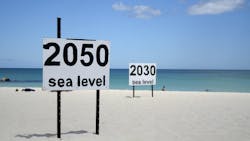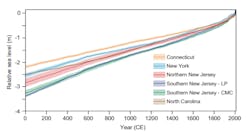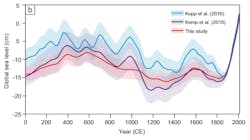Study: Atlantic Coast Sea-Level Rising Exponentially
In the past, whenever I’ve written about seal-level rise, it has been focused on South Florida. Although South Florida is undeniably at high economic risk from sea-level rise, it is certainly not the only area impacted.
Last month, an international team of researchers led by Jennifer Walker, a post-doctoral, sea-level researcher with Rutgers University’s Department of Marine and Coastal Sciences, published a new study in Nature Communications, entitled “Common Era sea-level budgets along the U.S. Atlantic coast.” The work focused primarily on northern New Jersey, but included data from five other Atlantic Coast sites in Connecticut, NYC, North Carolina, and two in southern NJ at Leeds Point and Cape May.
This study, which used sea-level budgets, concluded that when compared to the rate of sea-level rise over the past two millennia (referred to as the Common Era or CE, equivalent to the years AD), the fastest rate of rise have taken place in the past 100 years. According to the World Climate Research Programme’s Global Sea Level Budget Group, “Global mean sea level is an integral of changes occurring in the climate system…”
The sea-level budget, with which I was previously not familiar, “provides constraints on missing or poorly known contributions” to sea-level rise. The study showed that the rate of sea-level rise at the southern NJ site was approximately twice the average of the previous 2,000 years, due to the effects (among other factors, such as groundwater extraction and the temperature differentials of ocean currents) of glaciers and ice sheets. Interestingly, the closer the site to the Laurentide Ice Sheet, which existed in the last Ice Age, the higher the rate of rise due to sinking of the land mass.
Since there are no written records going back that far, the researchers depended on sea-level reconstructions, such as salt marshes, for much of their data. According to the study, their global sea-level estimate was consistent with global-mean sea-level (GMSL) rise budgets for the 20th century. They found that, at the global scale, sea level rise was primarily caused by increased ocean mass and volume resulting from melting glaciers and ice sheets. Thermal expansion caused by greenhouse warming of the oceans and the air was also a significant factor.
Climate change deniers – those who dismiss the contribution of human activities to climate change – often point to the “normal” cyclical changes in temperatures, storm severity, and sea-level rise. And it is certainly true that historically, at the global scale, there have been natural cycles of sea-levels rising and falling. However, the study concluded that the significant acceleration in the rate of sea-level rise in the past century was linked to anthropogenic climate change.
Yet another wakeup call from the scientific community that our politicians – and the rest of us – should not ignore.
##########
- Listen to Larry Clark in the first episode of our new podcast series, HPAC On the Air.
##########
A regular contributor to HPAC Engineering and a member of its editorial advisory board since 2012, Clark, LEED AP, O+M, is a principal at Sustainable Performance Solutions LLC, a south Florida-based engineering firm focusing on energy and sustainability. Email him at [email protected].
About the Author
Larry Clark
A member of HPAC Engineering’s Editorial Advisory Board, Lawrence (Larry) Clark, QCxP, GGP, LEED AP+, is principal of Sustainable Performance Solutions LLC, a South Florida-based engineering firm focused on energy and sustainability consulting. He has more than two dozen published articles on HVAC- and energy-related topics to his credit and frequently lectures on green-building best practices, central-energy-plant optimization, and demand-controlled ventilation.


